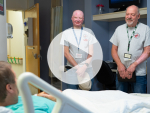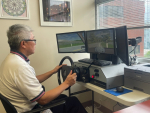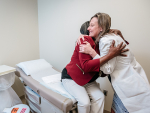Displaying items by tag: department of physical medicine and rehabilitation
UAB researchers are combining behavioral change theories, telemedicine and extended reality as they work to improve the physical and mental health of children with disabilities.
Tagged under
The NCHPAD has had a nationwide impact promoting the health, wellness and inclusion of people with disabilities into all areas of life.
Tagged under
UAB’s strategic planning continues to blaze its path to improve more lives by leveraging construction projects that include new and enhanced facilities across the institution, blooming green spaces and art installations.
Tagged under
- release
- office of the president
- facilities
- college of arts and sciences
- school of engineering
- department of biology
- department of physics
- department of chemistry
- department of biomedical informatics and data science
- student affairs
- school of medicine
- office of the senior vice president for finance and administration
- department of psychology
- school of nursing
- department of art and art history
- uab hospital
- department of emergency medicine
- strategic plan
- department of physical medicine and rehabilitation
- students
Megan Hays, Ph.D., explores five common productivity killers and offers practical solutions to overcome them.
After having a below-the-knee amputation, former SEC football player Ka’Darian Hill is using his story to motivate and inspire others.
Tagged under
Tagged under
Tagged under
Burn survivor who received innovative “spray-on skin” treatment now giving back to UAB burn patients
Tagged under
The multidisciplinary clinic will offer a full spectrum of sports and exercise medicine services to patients, including non-operative and surgical procedures and nutritional, biologic injections, cardio, exercise in pregnancy, and physical medicine and rehabilitation services.
Tagged under
UAB researchers aim to look at the value of using a driving simulator to predict on-road driving performance after TBI.
This study will examine the average treatment effects of M2M-C, a telehealth cardio-focused exercise program, on core indicators of major cardiometabolic risk factors.
In today’s busy world, people are inundated with information all competing for their selective attention. A UAB psychologist offers insight on how to maintain one’s focus at work and school.
A night or two of poor sleep can be normal. But if the problem persists, it may be time to seek professional advice.
Tagged under
Tagged under
Tagged under
UAB experts provide insight into alcohol and substance misuse, dangers and steps one can take to minimize the risk.
Tagged under
Hear personal tales of heartbreak and loss, tenderness and pain, and hope and reconciliation for the fourth annual StoryPower, presented by UAB Arts in Medicine.
Tagged under
Pelvic floor therapy provides a conservative and holistic approach to pelvic floor dysfunction, but many women do not know about the treatment. JJ Fagen, UAB Medicine’s pelvic floor therapist, discusses the benefits of pelvic floor therapy and pelvic floor exercises
Tagged under
A TBI Model System is awarded based on demonstrated excellence in research and knowledge translation that promotes health and quality of life for people with TBI and their families.



















